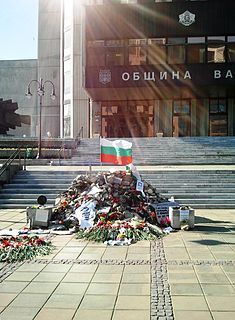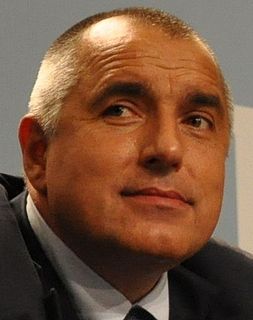"District Heating Sofia" is the district heating company in Sofia, the capital of Bulgaria. It is the oldest and largest district heating network in Bulgaria (and, according to the company's website, on the Balkan Peninsula), brought into use in 1949 with the opening of the first combined heat and power plant – TEC Sofia. [1]
Toplofikatsiya Sofia is a single-member JSC and holds a monopoly on heat distribution in the city. As of 2012, the company has a hot water and steam distribution network of over 950 km throughout the city [2] [3] (slide 3) and has over 430 000 clients. [4] (p. 15)
The company has four power stations – two cogeneration plants, and two heat-only boiler stations –
| Name | Heat energy capacity (MWt) | Heat energy output (2011) (MWth) | Electric capacity (MWe) | Electric output (2011) (MWeh) | Built | Notes |
|---|---|---|---|---|---|---|
| TEC Sofia | 1 790 [5] | 1 170 000 [6] | 125 | 315 000 [6] | 1949 [1] | - |
| TEC Sofia East | 2 010 [5] | 1 860 000 [6] | 186 | 650 000 [6] | 1964 [1] | - |
| OC Zemlyane | 580 [5] | 930 000 [6] | – | – | 1972 [1] | - |
| OC Lyulin | 580 [5] | 550 000 [6] | – | – | 1977 [1] | - |
| Total | 5 000 [2] [7] | 5 100 000 [6] [7] | 280 [7] | 1 020 000 [6] | – | - |
The company also has several temporary boiler stations throughout the city, which are usually only used during the winter months.
As of February 2013, part of the 2013 Bulgarian protests are aimed at the business model employed by Toplofikatsiya Sofia, with protesters complaining about high bills and lack of transparency in the company's practices. [8] [9] [10] [11] [12]

Sofia is the capital and largest city of Bulgaria. It is situated in the Sofia Valley at the foot of the Vitosha mountain in the western parts of the country. The city is built west of the Iskar river, and has many mineral springs, such as the Sofia Central Mineral Baths. It has a humid continental climate. Being in the centre of the Balkans, it is midway between the Black Sea and the Adriatic Sea, and closest to the Aegean Sea.

Cogeneration or combined heat and power (CHP) is the use of a heat engine or power station to generate electricity and useful heat at the same time.

A central heating system provides warmth to a number of spaces within a building and optionally also able to heat domestic hot water from one main source of heat. It is a component of heating, ventilation, and air conditioning (HVAC) systems, which can both cool and warm interior spaces.

District heating is a system for distributing heat generated in a centralized location through a system of insulated pipes for residential and commercial heating requirements such as space heating and water heating. The heat is often obtained from a cogeneration plant burning fossil fuels or biomass, but heat-only boiler stations, geothermal heating, heat pumps and central solar heating are also used, as well as heat waste from factories and nuclear power electricity generation. District heating plants can provide higher efficiencies and better pollution control than localized boilers. According to some research, district heating with combined heat and power (CHPDH) is the cheapest method of cutting carbon emissions, and has one of the lowest carbon footprints of all fossil generation plants.

About 200 TWh of energy in Bulgaria is consumed each year which is about 28 MWh per person, somewhat over the world average of 20 MWh. The largest sources are coal and oil, followed by nuclear.

FC Montana is a Bulgarian association football club based in Montana, which currently plays in the Second League, the second level of Bulgarian football league system.
Creative Energy is a private district heating company. The company was founded on November 1, 1968, by group of engineers with a desire to lower heating bills for buildings and to reduce the amount of pollution being created to provide heat downtown. In 2014, Central Heat Distribution was rebranded as Creative Energy and began taking on additional district heating projects in Vancouver and Toronto.

The 2008 Bulgarian Energy Crisis was a crisis in Bulgaria. The crisis affected more than a million households, mainly in the capital Sofia but also in Burgas, Pleven, and Vratsa. As of late September 2008, the issue was not resolved.

EVN Group is an Austrian-based producer and transporter of electricity, one of the largest in Europe having over three million customers in 14 countries. The company also operates in water treatment, natural gas supply and waste management business areas. It is the second-largest utility in Austria.

Solar power in Denmark contributes to a goal to use 100% renewable energy by 2050. The goal of 200 MW of photovoltaics by 2020 was reached eight years early, in 2012, and 36 MW was being installed each month. Denmark had 790 MW in late 2015. A total of 3,400 MW is expected to be installed by 2030. Many solar-thermal district heating plants exist and are planned in Denmark.

Knyaginya Maria Luiza Metro Station is the 21st station to open on the Sofia Metro in Bulgaria. It is situated near the Nadezhda road junction in the northern part of Sofia, at the intersection of Maria Luiza Boulevard and Gen. Stoletov Blvd. It opened on 31 August 2012 and is also known as the fifth station on the M2 line of the metro. It was also the first station on the path of the TBM, which worked on the section between stations 5-II and 9-II, entirely constructed by the Turkish company Doğuş Construction, part of Doğuş Holding. The station is a shallow triple-span station with two rows of concrete and steel columns. It serves two central tracks and two side platforms. There are four street entrances, two on each side of the boulevard after which the station is named. They lead to a central vestibule, directly above the station.

The 2013 Bulgarian protests against the first Borisov cabinet were civil demonstrations against high electricity and hot water bills resulting from monopolism in the sphere that began in Blagoevgrad on 28 January 2013, and subsequently spread to over 30 cities in Bulgaria that ended with the resignation of the Boyko Borisov government on 20 February 2013. They were caused by abnormally high electricity bills, but later turned into a mass non-partisan movement against the government and the political system. The events were marked by seven self-immolations, spontaneous demonstrations and a strong sentiment against political parties.

Plamen Goranov was a Bulgarian photographer and mountain climber, and a Varna-based local protest leader of the 2013 Bulgarian nationwide protests. He became a symbol of the Bulgarian social protest movements and a catalyst for nationwide protests and government resignations when on 20 February 2013 he set himself on fire in front of the Varna municipal building. He died from his injuries in a local hospital on 3 March, Bulgarian Liberation Day, a Bulgarian national holiday celebrating liberation from five centuries of Ottoman rule. Goranov protested against the organized crime group TIM and the TIM-controlled Varna mayor Kiril Yordanov.
Toplofikatsiya Ruse is the district heating company in the city of Ruse in Northern Bulgaria. As of 2011, the company is owned by Russian company Mechel.
Toplofikatsiya Plovdiv is the district heating company in the city of Plovdiv in Southern Bulgaria. It is one of the largest district heating networks in the country, also supplying heat energy to the town of Asenovgrad, around 10 km to the southeast, and serves a total of 35 000 customers.
Delyan Slavchev Peevski is a Bulgarian politician, oligarch, entrepreneur and media mogul. He served as MP from the parliamentary group of the DPS in the 41st, 42nd, 43rd and the 44th National Assembly of Bulgaria and is currently serving as MP in the 47th National Assembly.

The eighty-seventh Cabinet of Bulgaria was a minority government chaired by Boyko Borisov. The government was formed after Borisov's party, GERB, won the 2009 parliamentary election. It remained in power relying on support from the opposition parties for almost four years before resigning following nationwide protests.

Boyko Metodiev Borisov is a Bulgarian politician who served as the prime minister of Bulgaria from 2009 to 2013, 2014 to 2017, and 2017 to 2021, making him Bulgaria's second-longest serving prime minister to date.

Sotir Stefanov Tsatsarov is a Bulgarian jurist who served as the chief prosecutor of Bulgaria from December 2012 until December 2019. Tsatsarov allegedly owes his appointment to Delyan Peevski, a media mogul and member of Bulgaria's Parliament, and Prime Minister Boyko Borisov. His time in office has been overshadowed by controversial investigations of political opposition leaders, famous businessmen, and independent media. Prominent Bulgarian jurists, including the heads of Bulgaria's main appellate courts, have asked for his resignation.

The Holly Steam Combination Company was an American company that was the first steam heating producer to commercially distribute district heating from a central steam heating system. The company was established in 1877 by engineer Birdsill Holly when he formed a central steam heating system to heat multiple surrounding buildings in an immediate city area.